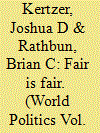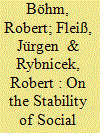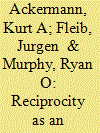|
|
|
Sort Order |
|
|
|
Items / Page
|
|
|
|
|
|
|
| Srl | Item |
| 1 |
ID:
141815


|
|
|
|
|
| Summary/Abstract |
Behavioral economics has shown that people often diverge from classical assumptions about self-interested behavior: they have social preferences and are concerned about issues of fairness and reciprocity. Social psychologists show that these preferences vary across actors, with some displaying more prosocial value orientations than others. Integrating a laboratory bargaining experiment with original archival research on Anglo-French and Franco-German diplomacy during the interwar period, the authors show how fairness and reciprocity matter in social interactions. That prosocials do not exploit their bargaining leverage to the degree that proselfs do helps explain why some pairs of actors are better able to avoid bargaining failure than others. In the face of consistent egoism on the part of negotiating partners, however, prosocials engage in negative reciprocity and adopt the same behaviors as proselfs.
|
|
|
|
|
|
|
|
|
|
|
|
|
|
|
|
| 2 |
ID:
180227


|
|
|
|
|
| Summary/Abstract |
Despite the omnipresence of inter-group conflicts, little is known about the heterogeneity and stability of individuals’ social preferences toward in-group and out-group members. To identify the prevalence and stability of social preferences in inter-group conflict, we gather quota-representative, incentivized data from a lab-in-the-field study during the heated 2016 Austrian presidential election. We assess social preferences toward in-group and out-group members one week before, one week after, and three months after the election. We find considerable heterogeneity in individuals’ group-(in)dependent social preferences. Utilizing various econometric strategies, we find largely stable social preferences over the course of conflict. Yet, there is some indication of variation, particularly when the conflict becomes less salient. Variation is larger in social preferences toward in-group members and among specific preference types. We discuss the theoretical implications of our findings and outline potential avenues for future research.
|
|
|
|
|
|
|
|
|
|
|
|
|
|
|
|
| 3 |
ID:
143348


|
|
|
|
|
| Summary/Abstract |
There is accumulating evidence that decision makers (DMs) are sensitive to the distribution of resources among themselves and others, beyond what is expected from the predictions of narrow self-interest. These social preferences are typically conceptualized as being static and existing independently of information about the other people influenced by a DM’s allocation choices. In this article, we consider the reactivity of a DM’s social preferences in response to information about the intentions or past behavior of the person to be affected by the DM’s allocation choices (i.e., how do social preferences change in relation to the other’s type). This article offers a conceptual framework for characterizing the link between distributive preferences and reciprocity, and reports on experiments in which these two constructs are disentangled and the relation between the two is characterized.
|
|
|
|
|
|
|
|
|
|
|
|
|
|
|
|
| 4 |
ID:
106125


|
|
|
|
|
| Publication |
2011.
|
| Summary/Abstract |
We study the determinants of social preferences for national defence and for police and law enforcement. For this task, we estimate a bivariate ordered probit model for a set of European countries (France, Finland, Norway, Portugal, Spain and Sweden) in 2006. Determinants of spending decisions for defence and police are found to be linked but are of significantly different magnitudes. Besides, measures against terrorist threats are positively linked to police and defence spending increases, while the subjective perception of fiscal pressure has no influence. Finally, no significant differences are found between Northern and Southern Europe.
|
|
|
|
|
|
|
|
|
|
|
|
|
|
|
|
|
|
|
|
|